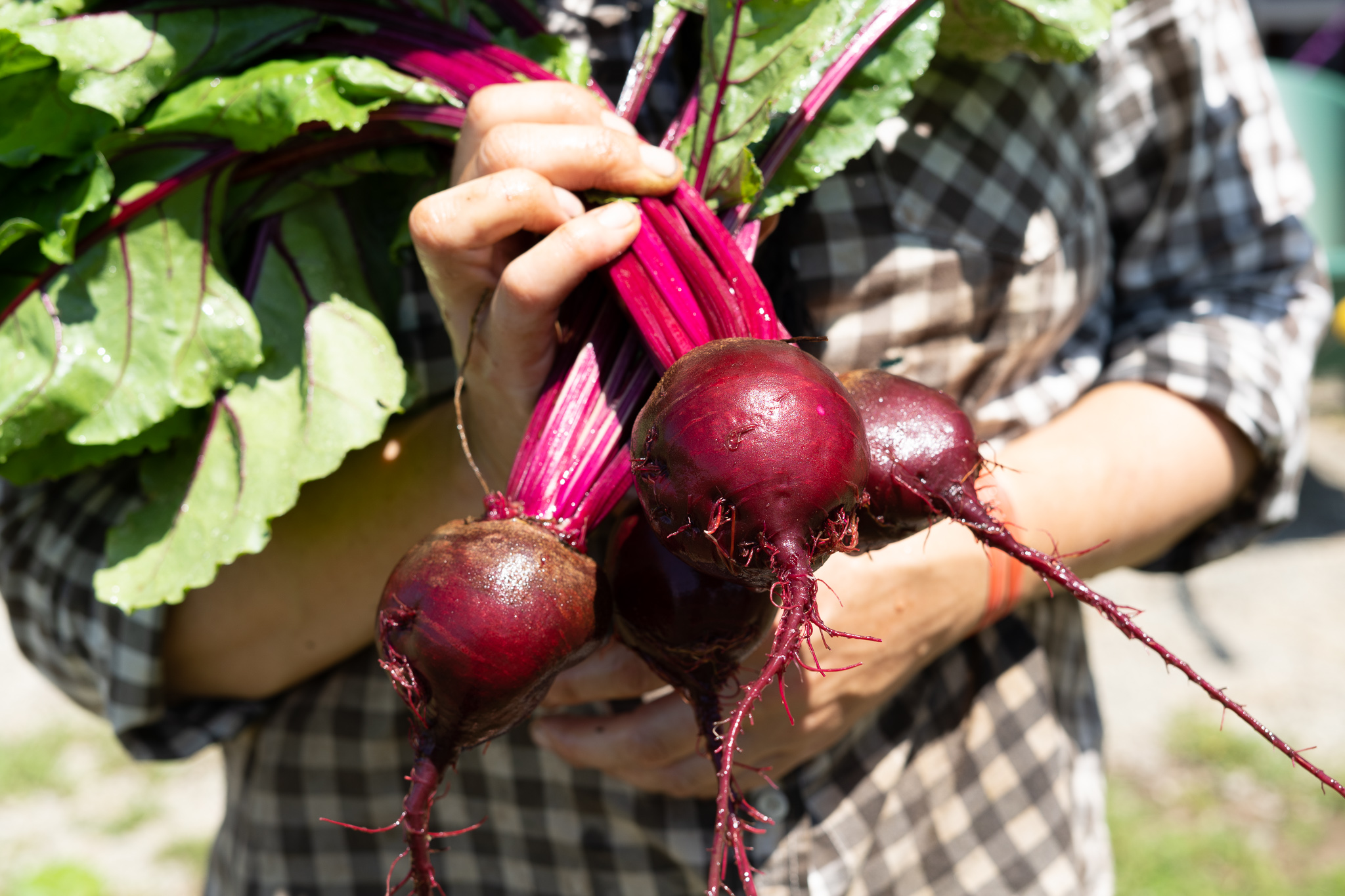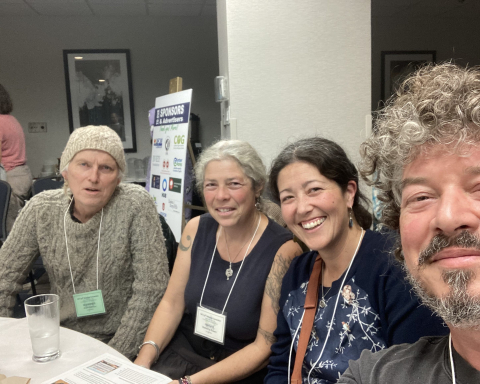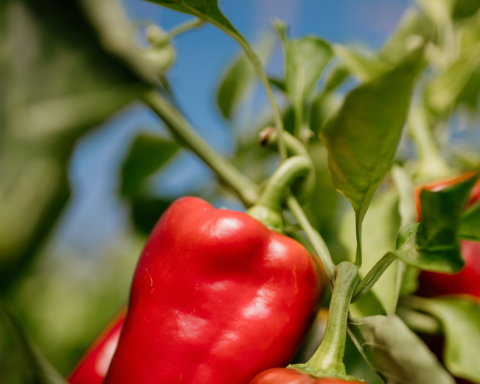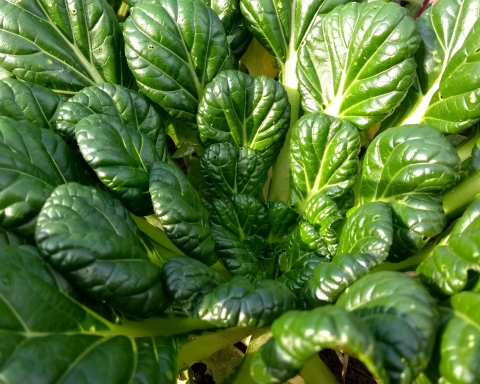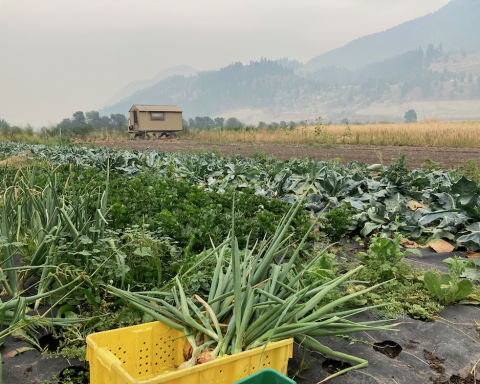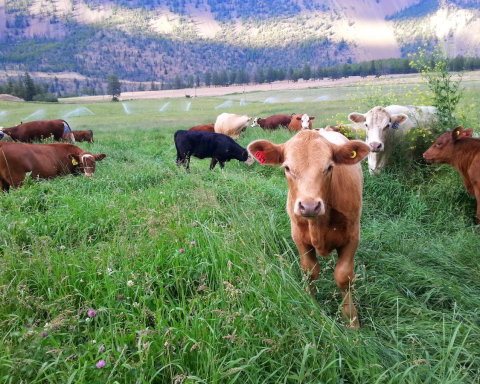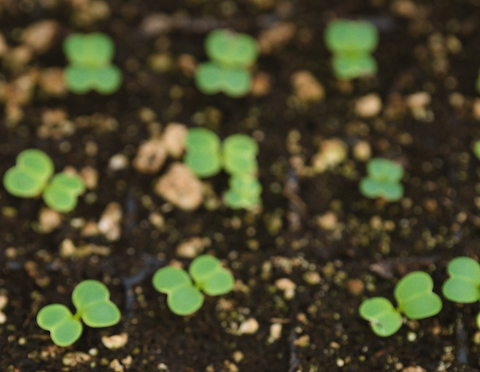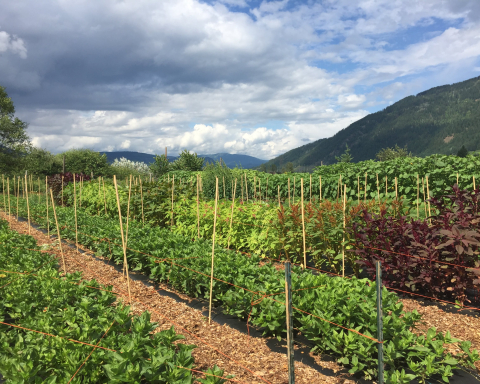Learning and Sharing at Kloverdalen Farm
Moss Dance
Kloverdalen Farm is a beautiful patch of great farmland in the Comox Valley producing mixed organic veggies. It is owned and operated by Kira Kotilla and Ingemar Dalen, along with their two adorable kids, Eilif and Olin.
I met Kira Kotilla in the Comox Valley. My five-acre farm was just down the road from where she grew up in Merville, BC. We both learned and apprenticed in the early- to mid-2000’s with some of the same mentors on southern Vancouver Island.
When she saw what I was up to with small-scale mixed organic veggies, she generously offered to come over and help out a few days a week. She taught me all kinds of things about soil and plant science, got a lot of work done, and she was really good with the tractor. She says one of the things she gleaned from that time on my farm was experience creating real hardpan! Oops.
Luckily for me, I sold the tractor and bought a walk-behind rototiller, and those early days of her volunteering on my farm ended up creating a lot of collaboration, learning, and fun. We ended up becoming co-founding members of Merville Organics Growers’ Cooperative with Arzeena Hamir, Neil Turner, Russell Heitzmann, Calliope Gazetas, and Robin Sturley.
By the time we met in 2013, Kira was well into her explorations of profitable small-scale farming. And her interest in techniques and tools that increase farm profitability was a huge boon for Merville Organics. Like many of us, she was originally drawn to farming by the ideals and the way of life it could offer. “I was inspired by my love of plants,” she says, “I wanted to work outside, and being very independent, I wanted to work on my own.”
So she did her homework. Kira wasn’t content to pursue her dreams without doing the research first to make sure it was a life path that could support her well.
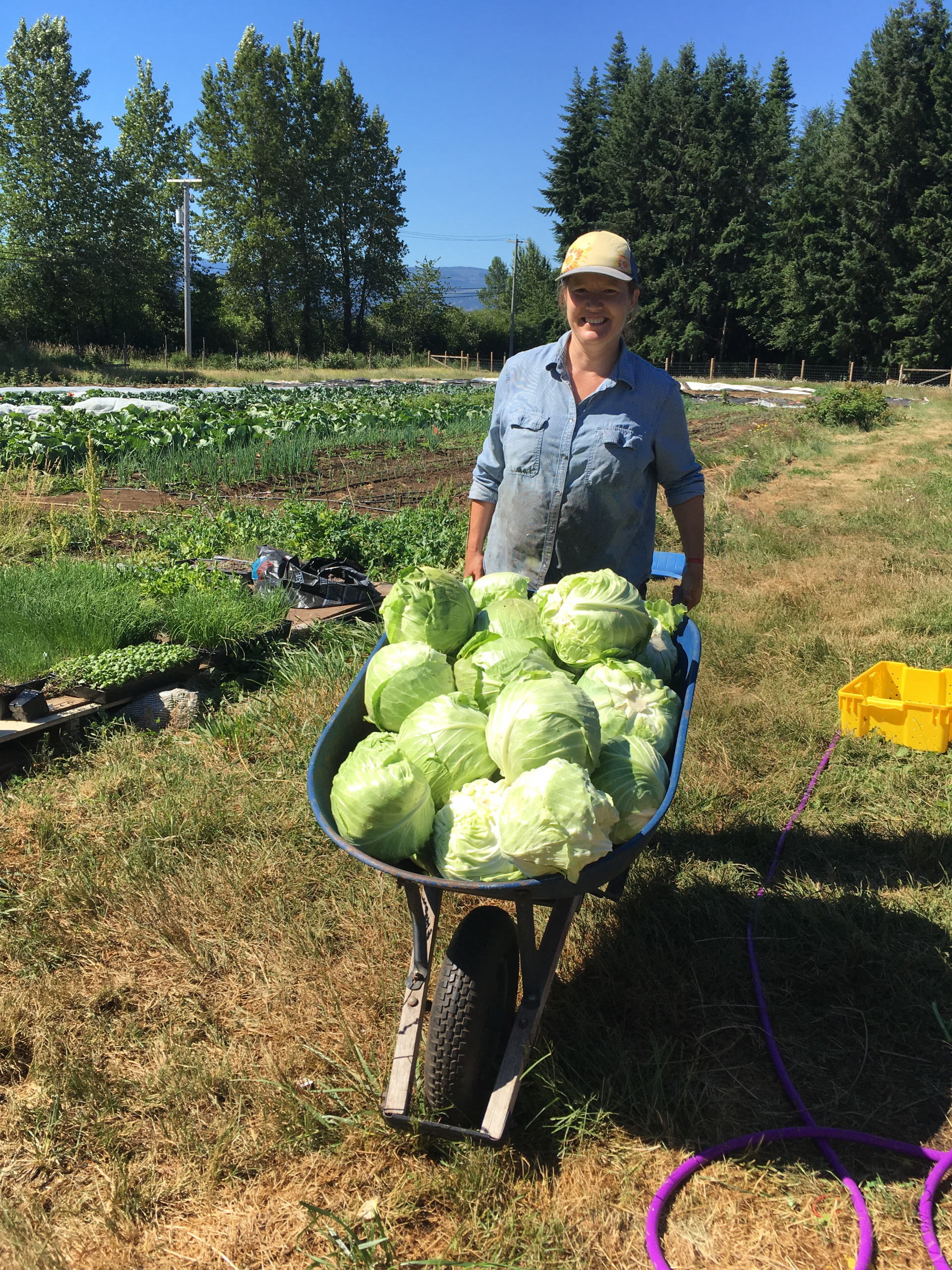
Early Farm Mentors
It’s amazing to think about the ways in which we all, as organic farmers, come from various tributaries into this river of organic agriculture, finding mentors along the way who lead us into pockets of communities across the country.
Kira first became interested in farming in the mid-2000’s, and found her way to Nova Scotia Agricultural College. She remembers thinking, “I hope there are organic farming courses there.” Once she was settled in at school, she realized that the Organic Agriculture Centre of Canada (OACC) was headquartered there, and many of her professors were a part of the OACC! These early mentors in organic agriculture lead to Kira’s first apprenticeship in Nova Scotia. Ever practical, Kira knew her dreams needed to be tested. During her school and apprenticeship years, she watched her mentors carefully to see if farming would be financially viable and worth trying in her own life.
She had a revelatory moment at a workshop by Crop Planning for Organic Farmers author and Ferme Coopérative Tourne-Sol farmer Daniel Brisebois. “Daniel inspired me at an ACORN conference back in 2008. He was one of the first speakers I’d ever heard who made me think being a small-scale organic farmer was a viable option.”
From there, she had to decide where to dig in and start her own farm. “I had a really great time at school in Nova Scotia and was really tempted to stay out there and buy land,” she says, “but I came back to BC.”
Kira’s encounter with Daniel Brisebois and the organic agriculture community in Nova Scotia had piqued her interest in co-operatives, so when she returned to BC, she was drawn to working with Rachel Fisher at Three Oaks Farm, one of the co-founding members of Saanich Organics. She spent the 2011 season in a Stewards Of Irreplaceable Land (SOIL) apprenticeship with Rachel, and learned about collaborative farming with the other farmers at Saanich Organics, Heather Stretch and Robin Tunnicliffe. During her apprenticeship, she mentions that the “educational field trips with SOIL connected me to many other mentors as well.”
By the time Kira ended up back in the Comox Valley, she was well-educated, and keen to get started on her own projects.
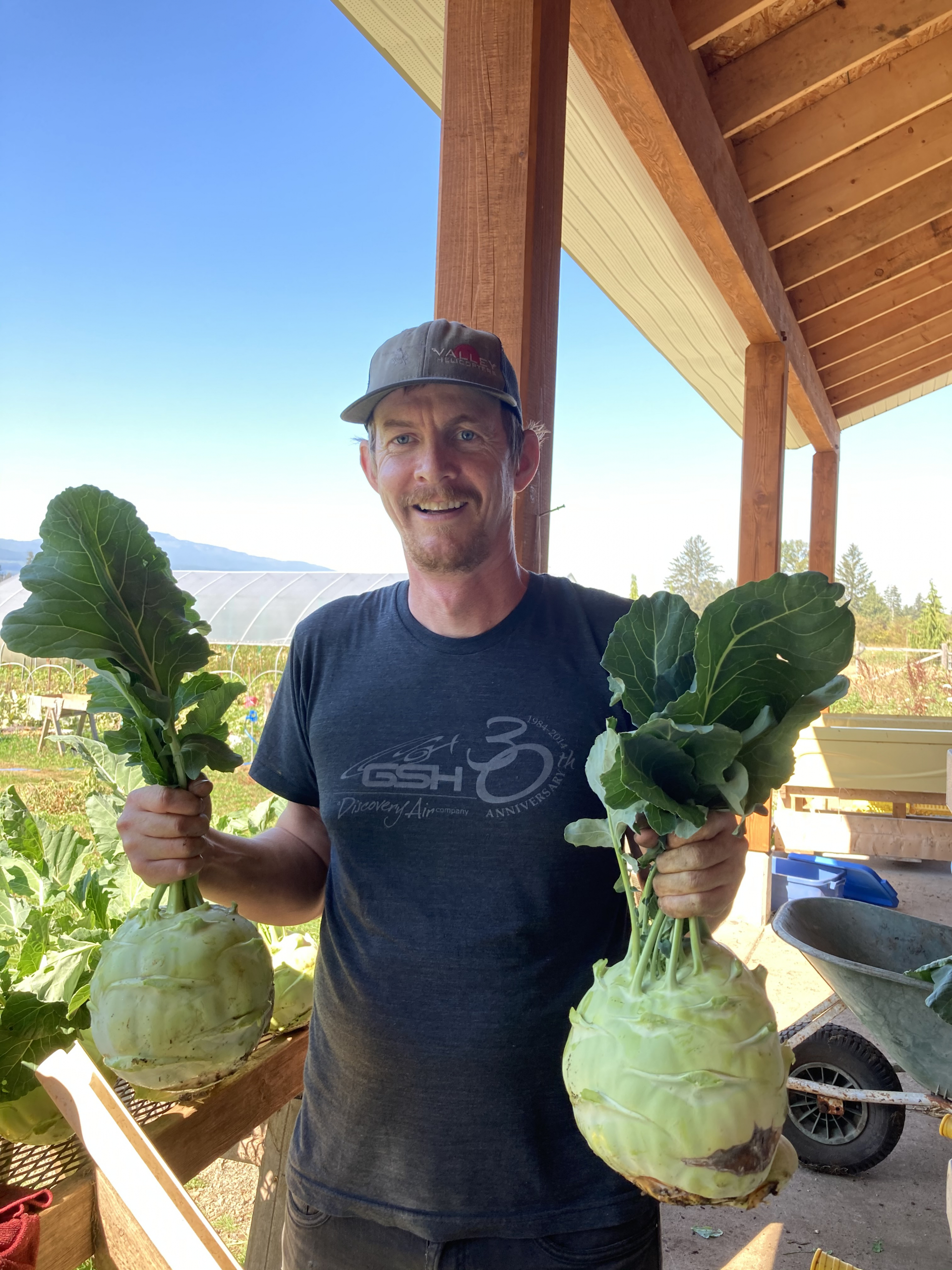
Never Stop Learning
Kira and Ingemar purchased their farm in 2014, a sweet 4.25-acre parcel right on a rural highway for excellent exposure and farm stand potential. She planted a garlic patch, and was planning to go back to camp cooking for one more season to save up money when Arzeena Hamir called her up and invited her to join Merville Organics Growers’ Cooperative. Kira decided to abandon her camp cooking plans and dive in that season, growing some staple crops for the co-op.
Once the co-op ball started rolling, the learning curve drew her in again, and of course, many new mentors appeared along the way. In that first year of farm operation, Kira and two other Merville Organics farmers had an opportunity to join the Business Mentorship Program via Young Agrarians with John and Katy Ehrlich at Alderlea Farm. Kira and I also took part in the Young Agrarians Business Mentorship Program and were matched with Frédéric Thériault at Ferme Coopérative Tourne-Sol, who helped to guide us in developing our cooperative business structures, financial goals, and principles of operation.
Kira continues to pursue educational opportunities wherever she can. Recently she had a chance to participate in the B.C. Agri-Business Planning Program and was matched with Chris Bodnar of Close to Home Organics.
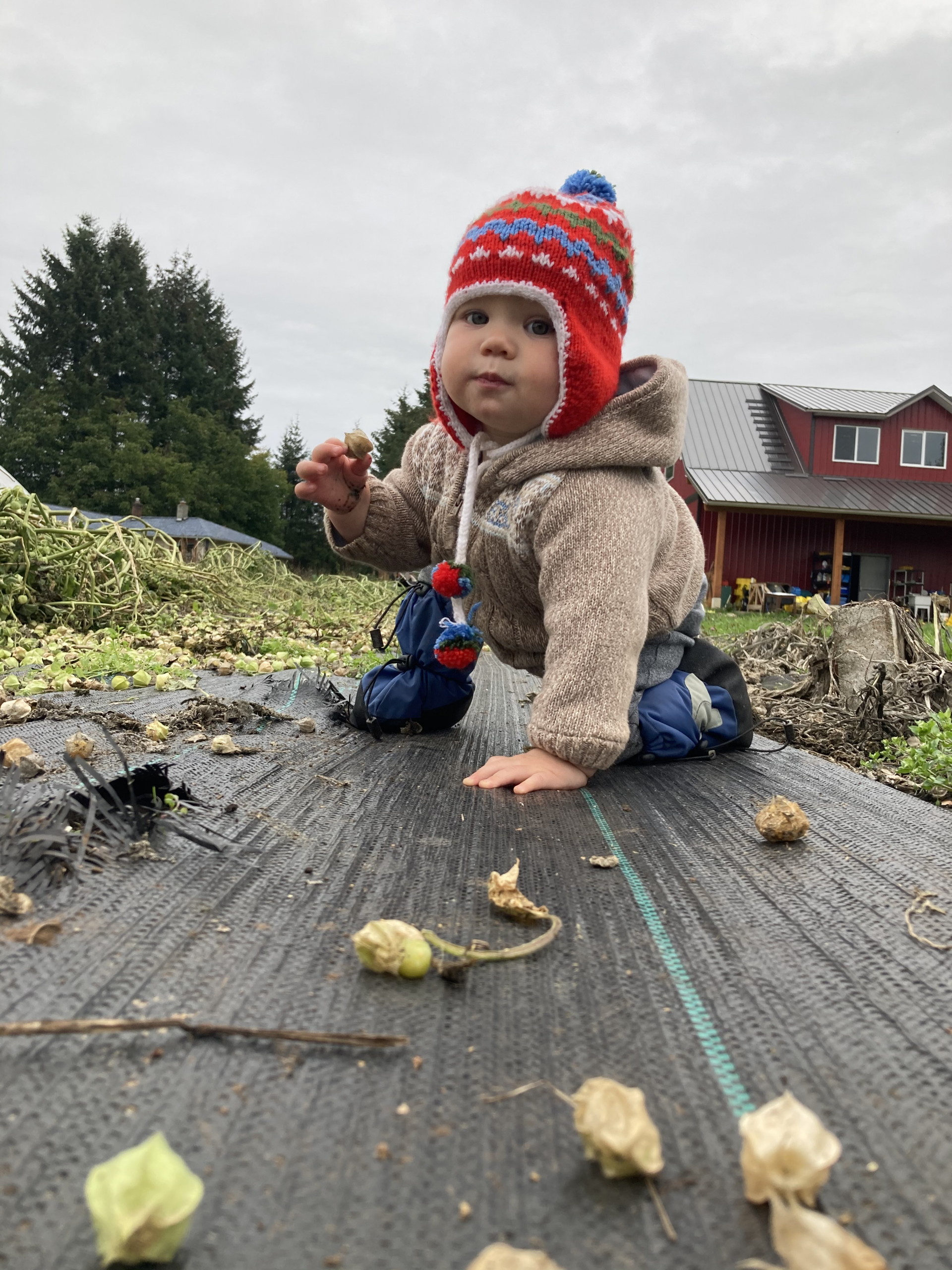
Favourite Crops
“People keep calling me the cabbage queen and I keep forgetting that I have this unsquashable drive to grow cabbage,” quips Kira. “But I’m trying really hard to grow less cabbage all the time. I try to find smaller varieties but they keep turning out twice as large as the seed catalogue says!”
The fact that Kira can’t grow a small cabbage is a testament to her excellent farming skills. That low-tillage approach is really working for her—the soil biology at Kloverdalen is off the charts.
Kira has had to diversify for this coming season, since Merville Organics Growers’ Cooperative recently dissolved. As it turned out, all the current farmer members found themselves outgrowing the need for a marketing co-operative, so they all struck out on their own. Despite Kira’s penchant for cabbage, she now has to grow the full spectrum of crops, including crops she used to rely on other Merville Organics farmers to grow for the collectively-planned CSA program and farmers markets.
Now that she’s running a one-farm show, Kira has pared her markets down to her popular farm gate stand and a CSA program. These markets are more limited and specific than the cooperative’s variety of market options, meaning she now has to crop plan carefully. Kira spent a lot of time learning new crop planning techniques this past winter. “It’s harder to grow for CSA as a single farm than with a co-op,” she says. Cooperative CSA planning has built in redundancy from multiple farms, so there’s less risk of being short on CSA box options from week-to-week. But the downside of that redundancy are the occasional gluts of certain crops—the hustle to find markets for fresh produce on the spot can be a real challenge.
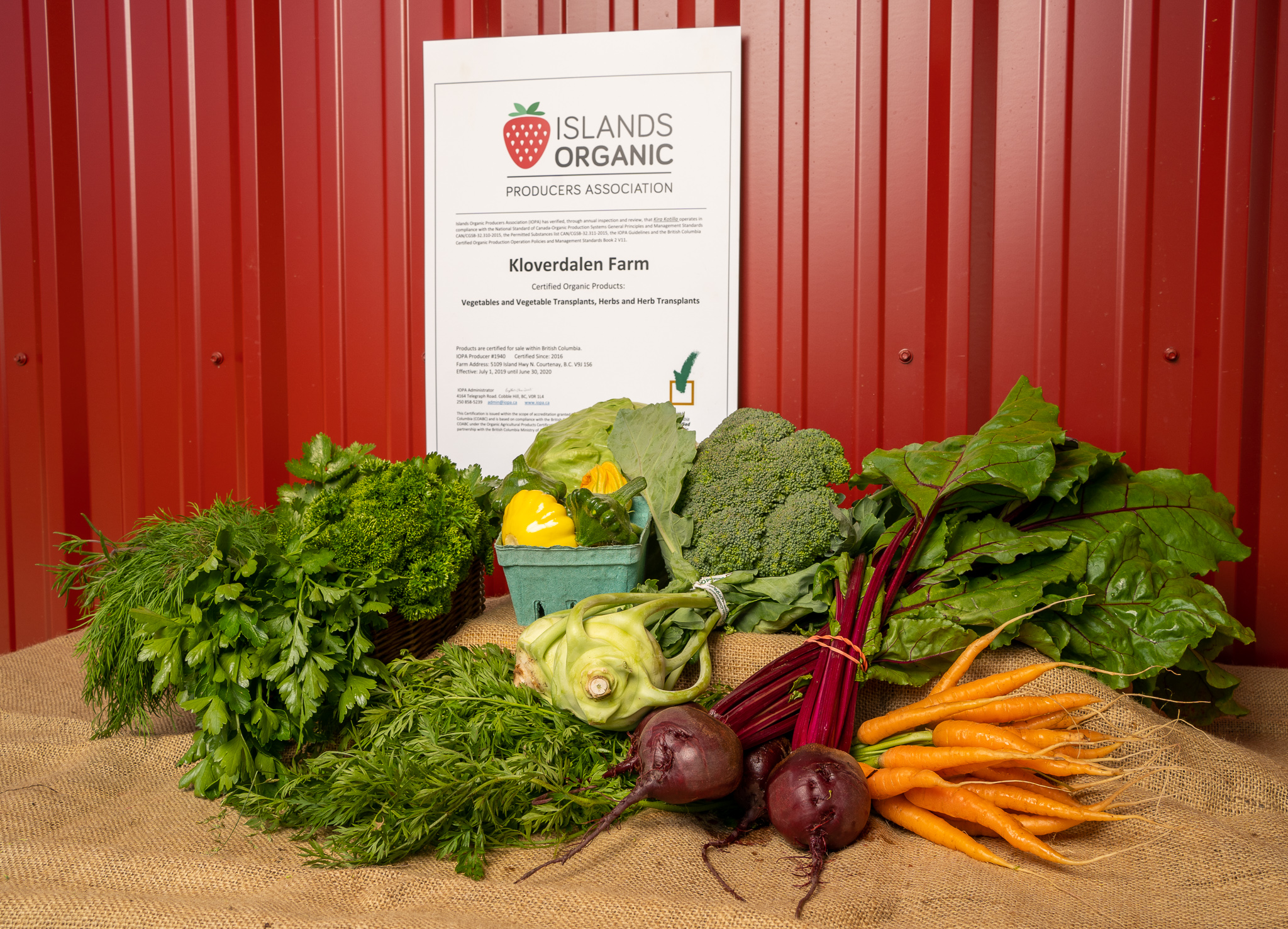
Favourite Tools
Kira tries to minimize tillage at the farm to encourage diverse soil biology. That’s why one of her most treasured tools is her broadfork. Luckily, she enjoys the action of digging with the broadfork. Kloverdalen employs one local person full-time each season, and they work hard to reduce their fossil fuel use through hand labour. They also aim to minimize plastic use at every level of production.
Kira and I share a love of the humble Ho-Mi, an ancient Korean gardening tool. I got my first Ho-Mi when I was a farm apprentice with Mary Alice Johnson at ALM Farm in Sooke, so when Kira was spending time working with me at my farm, I gave her one too. I like to imagine all these farmers, connected by our time in the fields together, digging with our Ho-Mis—our little iron spear-shaped diggers remaining a familiar constant throughout all the changes of life. Kira said I should mention she has both the short- and long-handled Ho-Mi, and she loves them both.
Her most modern tool acquisition is the Jang Seeder, and she says she loves it, despite (or maybe because of) the learning curve. See, I told you—she just loves a good challenge.
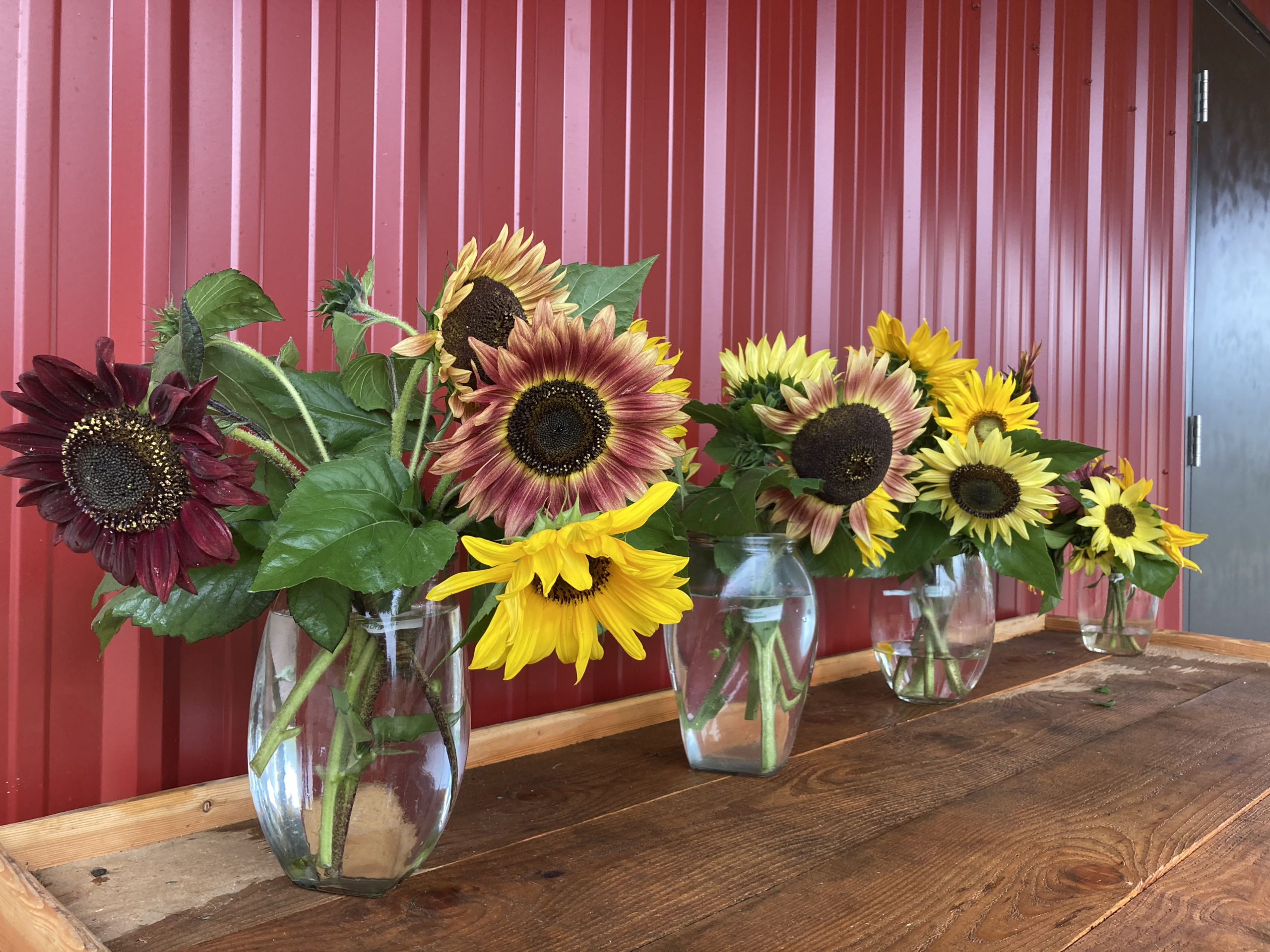
Hot Tips: Farming with Kids
I’ve always been curious about how Kira gets all that farming done with two young kids in tow, so I asked if she had any hot tips for farming parents. “Don’t be shy about using daycare!” she laughs. “And just abandon perfectionism—you have to accept a certain amount of destruction if you’re going to have them tagging along with you.”
Kira copes by allowing a certain amount of chaos with the kids in the field: “I let them dig holes right in the garden beds just to keep them entertained while I’m working.” Kira also suggests wasting a little water to keep your sanity. Let the kids play with the hose.
Growing into the Future
In the past seven years, Kira and Ingemar have managed to grow a vacant field with a dilapidated farmhouse and decaying shed into a thriving small farm with excellent infrastructure, soil fertility, and markets to sell their produce. And it all started with a quarter-acre garlic patch and an invitation to join a co-op. Since then, Kira and Ingemar have expanded to a full acre in production with new infrastructure, including a greenhouse and barn with a farm stand.
I’ve been enjoying watching her story unfold, gathering up seeds of knowledge from her experiences and seeing her develop into a leader in her field, both literally and figuratively. I know Kloverdalen Farm is just going to keep growing and adapting, even in these unpredictable times—and I am grateful for their example of resilience, curiosity and innovation.
Moss Dance (she/they) is an organic gardener on Territories of Hul’qumi’num and SENĆOŦEN speaking peoples (Salt Spring Island), and works with the BC Organic Grower as layout editor. Moss spent a decade farming and organizing in K’ómoks Territory as a founding member of Merville Organics. She is currently completing her Diploma of Acupuncture in Victoria, BC, and hopes to have a market garden again someday.
Feature image: Kira Kotilla holding beautiful beets. Credit: zoomphotography.ca


